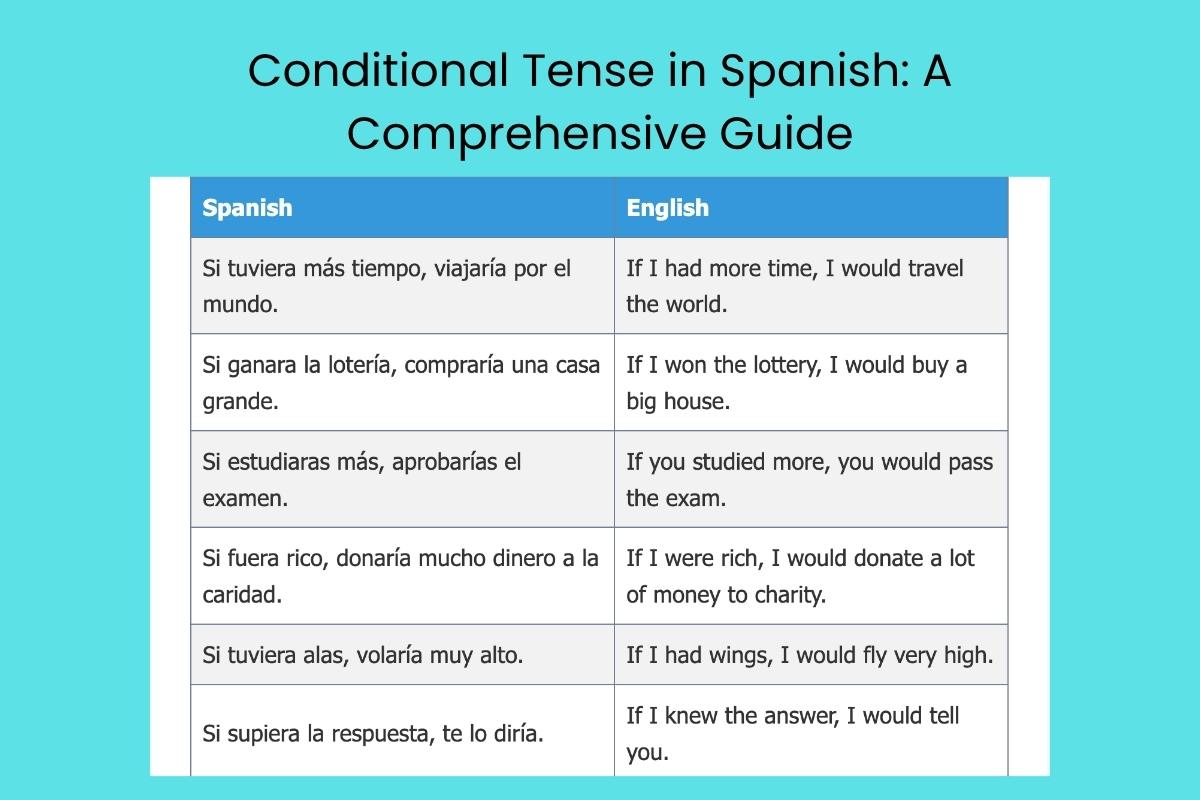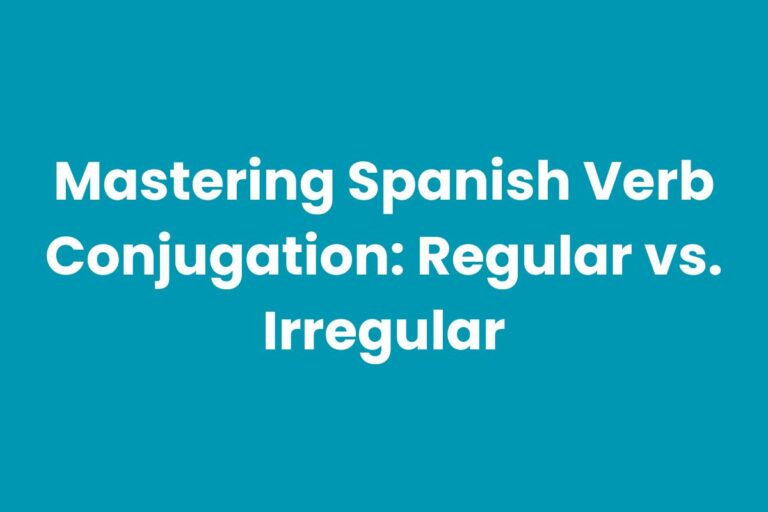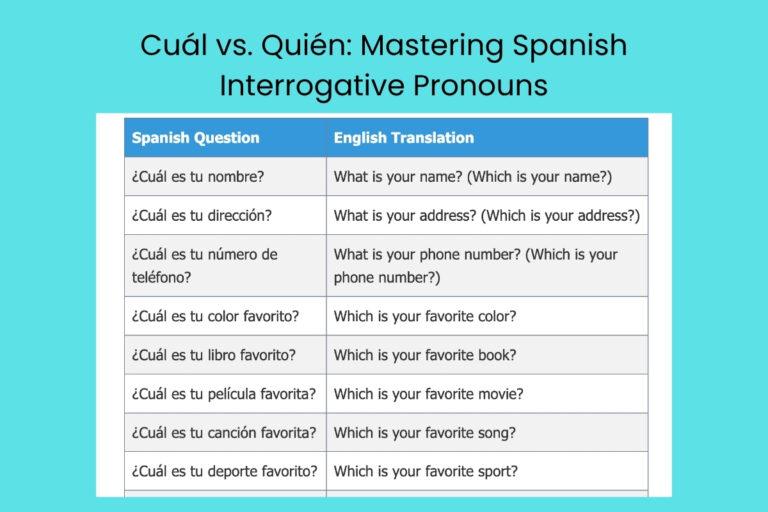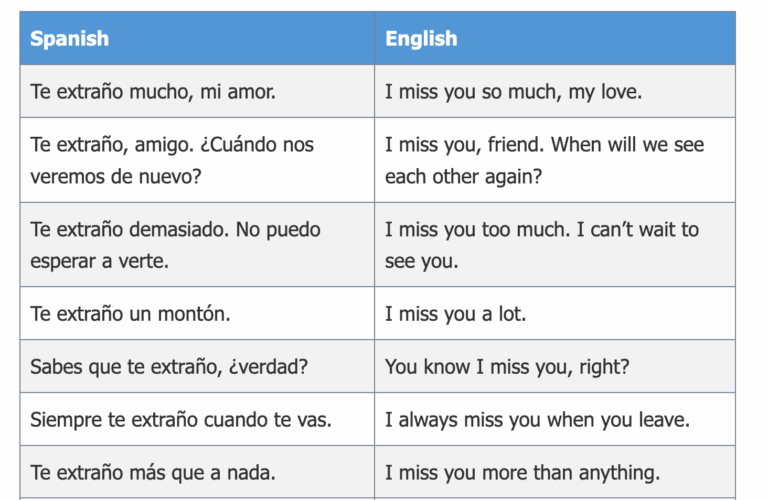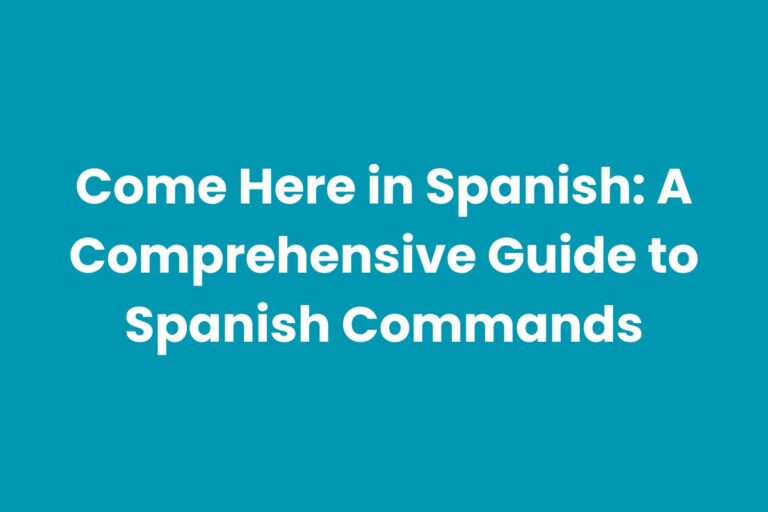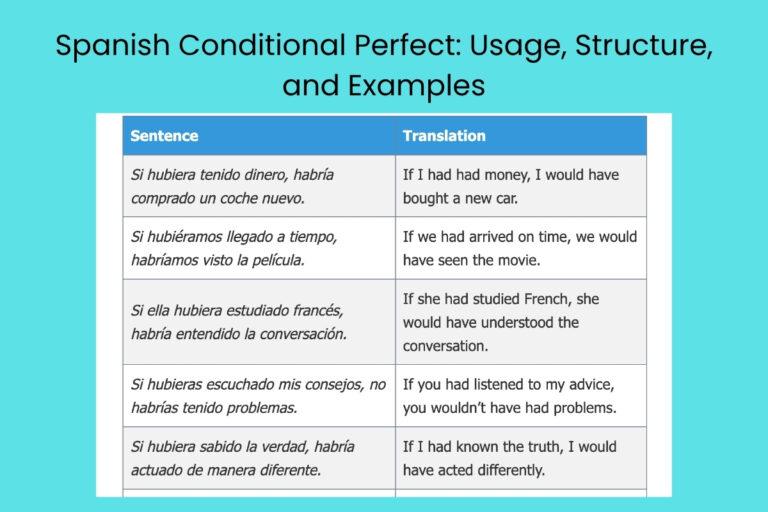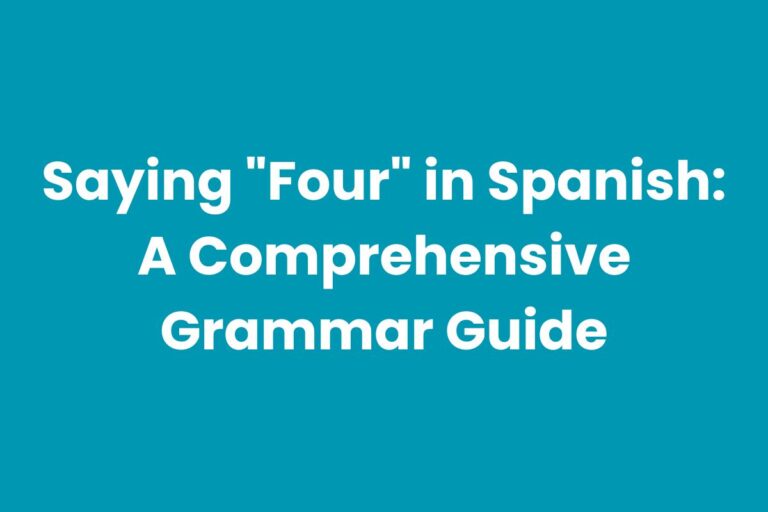Conditional Tense in Spanish: A Comprehensive Guide
The conditional tense in Spanish, known as el condicional, is essential for expressing hypothetical situations, polite requests, and possibilities. Mastering this tense allows you to communicate nuances of uncertainty and conditionality, adding depth and sophistication to your Spanish. This article explores the formation, usage, and common pitfalls of the conditional tense, providing a solid foundation for both beginners and advanced learners. Understanding the conditional tense is crucial for anyone aiming to achieve fluency and communicate effectively in a variety of contexts. This comprehensive guide will benefit students, travelers, and professionals alike, enabling them to confidently navigate complex conversations and express themselves with precision.
Table of Contents
- Definition of the Conditional Tense
- Structural Breakdown
- Types and Categories
- Examples of the Conditional Tense
- Usage Rules
- Common Mistakes
- Practice Exercises
- Advanced Topics
- FAQ
- Conclusion
Definition of the Conditional Tense
The conditional tense in Spanish, or el condicional simple, is a verb tense used to express what would happen under certain conditions. It indicates a possibility, a probability, or a conjecture about the future, often dependent on a hypothetical scenario. The conditional tense is also used to make polite requests or suggestions, softening the tone and making the communication more courteous. It essentially describes actions that are contingent on something else occurring.
In terms of classification, the conditional tense is a simple tense, meaning it is formed with a single verb form rather than an auxiliary verb and a participle. Functionally, it serves to express hypothetical situations, polite requests, probabilities, and conjectures.
The contexts in which the conditional tense is used are varied, ranging from everyday conversations to formal writing. For example, you might use it to say “I would travel if I had more money” or to politely ask “Would you help me, please?”.
Function of the Conditional Tense
The primary function of the conditional tense is to express actions that are dependent on a condition. It allows speakers to discuss hypothetical scenarios and their potential outcomes.
The conditional tense is also used to express politeness, softening requests or suggestions. Additionally, it can indicate probability or speculation about past events from a future perspective.
Contexts of the Conditional Tense
The conditional tense appears in various contexts, including hypothetical situations, polite requests, conjectures about the past, and softened statements. In hypothetical situations, it often appears in conjunction with the subjunctive mood in si (if) clauses. For polite requests, it makes the request less direct and more courteous. When speculating about the past, it suggests a probability or possibility that something occurred. The conditional tense adds nuance and sophistication to communication in Spanish, making it an invaluable tool for expressing complex ideas.
Structural Breakdown
The conditional tense in Spanish is formed by adding specific endings to the infinitive of the verb. This makes it relatively straightforward to conjugate once you understand the pattern. The endings are the same for all three verb conjugations (-ar, -er, and -ir verbs). Let’s explore the structural components and the conjugation process.
The formula for forming the conditional tense is: Infinitive + Conditional Endings. The conditional endings are: -ía, -ías, -ía, -íamos, -íais, -ían. These endings are added directly to the infinitive form of the verb, without removing the -ar, -er, or -ir ending. This is a key difference compared to other tenses where the infinitive ending is removed before adding the conjugation endings.
For regular verbs, this process is consistent and predictable. Irregular verbs, however, often have irregular stems in the conditional tense, similar to their irregular stems in the future tense.
This means that while the endings remain the same, the stem to which they are added may change. These irregular stems need to be memorized, but the conditional endings themselves are always consistent.
Regular Verbs
For regular verbs, forming the conditional tense is straightforward. You simply add the conditional endings to the infinitive form of the verb.
Here are some examples:
- Hablar (to speak): Hablaría, hablarías, hablaría, hablaríamos, hablaríais, hablarían
- Comer (to eat): Comería, comerías, comería, comeríamos, comeríais, comerían
- Vivir (to live): Viviría, vivirías, viviría, viviríamos, viviríais, vivirían
Irregular Verbs
Some verbs have irregular stems in the conditional tense. These irregularities are the same as those found in the future tense.
The endings, however, remain consistent. Common irregular verbs include:
- Tener (to have): Tendría, tendrías, tendría, tendríamos, tendríais, tendrían
- Poder (to be able to): Podría, podrías, podría, podríamos, podríais, podrían
- Saber (to know): Sabría, sabrías, sabría, sabríamos, sabríais, sabrían
- Poner (to put): Pondría, pondrías, pondría, pondríamos, pondríais, pondrían
- Salir (to leave): Saldría, saldrías, saldría, saldríamos, saldríais, saldrían
- Hacer (to do/make): Haría, harías, haría, haríamos, haríais, harían
- Decir (to say): Diría, dirías, diría, diríamos, diríais, dirían
- Venir (to come): Vendría, vendrías, vendría, vendríamos, vendríais, vendrían
It’s essential to memorize these irregular stems to correctly conjugate these verbs in the conditional tense. Practice and repetition are key to mastering these irregularities.
Types and Categories
While the conditional tense itself doesn’t have distinct “types,” its usage can be categorized based on the function it serves in a sentence. These categories include expressing hypothetical situations, making polite requests, expressing probability or conjecture, and softening statements.
Hypothetical Situations
The conditional tense is commonly used to describe what would happen if a certain condition were met. This is often seen in si (if) clauses, where the conditional tense is paired with the subjunctive mood. The si clause presents the condition, and the conditional tense describes the outcome if that condition were true.
Polite Requests
Using the conditional tense can make requests sound more polite and less demanding. It softens the tone of the request, making it more courteous.
This usage is particularly common in customer service or formal situations where politeness is valued.
Probability or Conjecture
The conditional tense can also express probability or conjecture about past events, especially when viewed from a future perspective. It suggests a possibility that something occurred, but without certainty.
This usage adds a layer of speculation to the statement.
Softening Statements
Similar to polite requests, the conditional tense can soften statements, making them less direct or assertive. This can be useful when expressing opinions or delivering potentially negative information.
It allows the speaker to convey the message in a more gentle and considerate manner.
Examples of the Conditional Tense
To illustrate the usage of the conditional tense, let’s explore numerous examples categorized by their function. These examples will provide a clear understanding of how to use the conditional tense in various contexts.
Examples: Hypothetical Situations
In this section, we will explore examples of the conditional tense used in hypothetical situations, often within si (if) clauses. These examples demonstrate how the conditional tense expresses potential outcomes based on specific conditions.
| Spanish | English |
|---|---|
| Si tuviera más tiempo, viajaría por el mundo. | If I had more time, I would travel the world. |
| Si ganara la lotería, compraría una casa grande. | If I won the lottery, I would buy a big house. |
| Si estudiaras más, aprobarías el examen. | If you studied more, you would pass the exam. |
| Si fuera rico, donaría mucho dinero a la caridad. | If I were rich, I would donate a lot of money to charity. |
| Si tuviera alas, volaría muy alto. | If I had wings, I would fly very high. |
| Si supiera la respuesta, te lo diría. | If I knew the answer, I would tell you. |
| Si no lloviera, iríamos al parque. | If it weren’t raining, we would go to the park. |
| Si tuviera la oportunidad, aprendería a tocar el piano. | If I had the opportunity, I would learn to play the piano. |
| Si fuera tú, aceptaría el trabajo. | If I were you, I would accept the job. |
| Si me invitaran, asistiría a la fiesta. | If they invited me, I would attend the party. |
| Si hablara inglés, conseguiría un mejor trabajo. | If I spoke English, I would get a better job. |
| Si tuviera un coche, viajaría más a menudo. | If I had a car, I would travel more often. |
| Si pudiera, te ayudaría con el proyecto. | If I could, I would help you with the project. |
| Si tuviera hijos, los llevaría al zoológico. | If I had children, I would take them to the zoo. |
| Si fuera más joven, jugaría al fútbol. | If I were younger, I would play soccer. |
| Si tuviera una varita mágica, cumpliría todos mis deseos. | If I had a magic wand, I would fulfill all my wishes. |
| Si no tuviera que trabajar, dormiría todo el día. | If I didn’t have to work, I would sleep all day. |
| Si tuviera un barco, navegaría por el océano. | If I had a boat, I would sail the ocean. |
| Si pudiera retroceder en el tiempo, cambiaría algunas cosas. | If I could go back in time, I would change some things. |
| Si tuviera más confianza, hablaría en público. | If I had more confidence, I would speak in public. |
| Si fuera un pájaro, volaría a lugares lejanos. | If I were a bird, I would fly to distant places. |
| Si tuviera un superpoder, salvaría el mundo. | If I had a superpower, I would save the world. |
| Si no tuviera miedo, haría paracaidismo. | If I weren’t afraid, I would go skydiving. |
Examples: Polite Requests
This section provides examples of how the conditional tense is used to make polite requests. Using the conditional tense softens the tone and makes the request more courteous and less demanding.
| Spanish | English |
|---|---|
| ¿Podrías ayudarme con esto, por favor? | Could you help me with this, please? |
| ¿Le importaría cerrar la ventana? | Would you mind closing the window? |
| ¿Querrías venir a cenar con nosotros? | Would you like to come to dinner with us? |
| ¿Te gustaría tomar un café? | Would you like to have a coffee? |
| ¿Podrías prestarme tu bolígrafo? | Could you lend me your pen? |
| ¿Le importaría bajar la voz? | Would you mind lowering your voice? |
| ¿Querrías acompañarme al cine? | Would you like to accompany me to the cinema? |
| ¿Te gustaría bailar? | Would you like to dance? |
| ¿Podrías decirme la hora? | Could you tell me the time? |
| ¿Le importaría esperar un momento? | Would you mind waiting a moment? |
| ¿Querrías probar este pastel? | Would you like to try this cake? |
| ¿Te gustaría ir de compras? | Would you like to go shopping? |
| ¿Podrías abrir la puerta? | Could you open the door? |
| ¿Le importaría darme su opinión? | Would you mind giving me your opinion? |
| ¿Querrías venir a mi fiesta? | Would you like to come to my party? |
| ¿Te gustaría dar un paseo? | Would you like to take a walk? |
| ¿Podrías revisar este documento? | Could you review this document? |
| ¿Le importaría darme un consejo? | Would you mind giving me some advice? |
| ¿Querrías visitar el museo? | Would you like to visit the museum? |
| ¿Te gustaría escuchar música? | Would you like to listen to music? |
| ¿Podrías ayudarme a cargar esto? | Could you help me carry this? |
| ¿Le importaría cambiar esta cita? | Would you mind changing this appointment? |
| ¿Querrías aprender español? | Would you like to learn Spanish? |
Examples: Probability or Conjecture
In this section, we’ll examine how the conditional tense expresses probability or conjecture, particularly about past events as viewed from the present. These examples illustrate how the conditional tense adds a degree of uncertainty to statements about the past.
| Spanish | English |
|---|---|
| Serían las diez cuando llegó. | It must have been ten o’clock when he arrived. |
| Habría unas cincuenta personas en la fiesta. | There must have been about fifty people at the party. |
| ¿Cuánto costaría este coche? | I wonder how much this car cost. |
| ¿Quién llamaría a esta hora? | I wonder who could be calling at this hour? |
| Estaría cansado después del viaje. | He must have been tired after the trip. |
| Tendría unos veinte años cuando se casó. | She must have been about twenty years old when she got married. |
| Habrían terminado el trabajo ayer. | They must have finished the work yesterday. |
| Sería un buen jugador de fútbol. | He must have been a good soccer player. |
| Habría estudiado mucho para el examen. | He must have studied a lot for the exam. |
| Tendría mucho dinero en el banco. | He must have a lot of money in the bank. |
| Habría llovido durante la noche. | It must have rained during the night. |
| Sería una persona muy importante. | He must be a very important person. |
| Habría comido algo antes de venir. | He must have eaten something before coming. |
| Tendría una casa grande en la playa. | He must have a big house on the beach. |
| Habría leído el libro antes de la clase. | He must have read the book before the class. |
| Sería un buen cocinero. | He must be a good cook. |
| Habría visto la película antes. | He must have seen the movie before. |
| Tendría un buen trabajo en la ciudad. | He must have a good job in the city. |
| Habría llegado tarde al aeropuerto. | He must have arrived late at the airport. |
| Sería un buen profesor. | He must be a good teacher. |
| Habría visitado muchos países. | He must have visited many countries. |
| Tendría una familia grande. | He must have a big family. |
| Habría dormido bien anoche. | He must have slept well last night. |
Examples: Softening Statements
This section showcases how the conditional tense is used to soften statements, making them less direct and more tactful. These examples demonstrate how to express opinions or deliver potentially negative information in a gentler manner.
| Spanish | English |
|---|---|
| Me gustaría expresar mi opinión. | I would like to express my opinion. |
| Sería conveniente revisar los datos. | It would be advisable to review the data. |
| Pensaría que es una buena idea. | I would think that it is a good idea. |
| Me gustaría sugerir otra opción. | I would like to suggest another option. |
| Sería mejor llegar temprano. | It would be better to arrive early. |
| Me gustaría hablar contigo en privado. | I would like to speak with you in private. |
| Sería útil tener más información. | It would be helpful to have more information. |
| Pensaría que deberías descansar. | I would think that you should rest. |
| Me gustaría pedirte un favor. | I would like to ask you a favor. |
| Sería interesante visitar ese lugar. | It would be interesting to visit that place. |
| Me gustaría saber más sobre el tema. | I would like to know more about the topic. |
| Sería prudente tener cuidado. | It would be wise to be careful. |
| Pensaría que es necesario practicar más. | I would think that it is necessary to practice more. |
| Me gustaría darte las gracias. | I would like to thank you. |
| Sería un honor trabajar contigo. | It would be an honor to work with you. |
| Me gustaría invitarte a mi casa. | I would like to invite you to my house. |
| Sería un placer conocerte. | It would be a pleasure to meet you. |
| Pensaría que es una buena oportunidad. | I would think that it is a good opportunity. |
| Me gustaría participar en el proyecto. | I would like to participate in the project. |
| Sería genial ir de vacaciones. | It would be great to go on vacation. |
| Me gustaría tener más tiempo libre. | I would like to have more free time. |
| Sería fantástico aprender otro idioma. | It would be fantastic to learn another language. |
| Pensaría que es importante ser puntual. | I would think that it is important to be punctual. |
Usage Rules
The conditional tense in Spanish follows specific rules that govern its proper use. Understanding these rules is crucial for accurate and effective communication.
These rules cover the formation of the conditional tense, its use in hypothetical situations, and its role in expressing politeness and probability.
Rule 1: Formation: The conditional tense is formed by adding the endings -ía, -ías, -ía, -íamos, -íais, -ían to the infinitive of the verb. This applies to both regular and irregular verbs, although irregular verbs may have irregular stems.
Rule 2: Hypothetical Situations: The conditional tense is often used in si (if) clauses to express what would happen if a certain condition were met. Typically, the si clause uses the imperfect subjunctive, and the main clause uses the conditional tense.
Rule 3: Polite Requests: Using the conditional tense makes requests more polite and less demanding. It softens the tone of the request, making it more courteous.
Rule 4: Probability and Conjecture: The conditional tense can express probability or conjecture about past events, viewed from a present or future perspective. It suggests a possibility that something occurred, but without certainty.
Rule 5: Softening Statements: The conditional tense can soften statements, making them less direct or assertive. This can be useful when expressing opinions or delivering potentially negative information.
Exceptions and Special Cases
While the rules for using the conditional tense are generally consistent, there are some exceptions and special cases to be aware of. These exceptions often involve irregular verbs or specific idiomatic expressions.
Irregular Verbs: As mentioned earlier, some verbs have irregular stems in the conditional tense. These irregularities must be memorized. Examples include tener (tendría), poder (podría), and saber (sabría).
Sequence of Tenses: In complex sentences, the sequence of tenses must be carefully considered. When using the conditional tense in conjunction with the subjunctive mood, ensure that the tenses are correctly aligned to maintain grammatical accuracy.
Idiomatic Expressions: Certain idiomatic expressions may use the conditional tense in ways that don’t strictly adhere to the standard rules. These expressions should be learned as individual units.
Common Mistakes
Learners often make common mistakes when using the conditional tense in Spanish. Recognizing and avoiding these mistakes is essential for improving accuracy and fluency.
These mistakes typically involve incorrect verb conjugations, misuse of the conditional tense in hypothetical situations, and confusion with other tenses.
Mistake 1: Incorrect Conjugations: A common mistake is to incorrectly conjugate verbs in the conditional tense, especially irregular verbs. Ensure that you memorize the irregular stems and the correct conditional endings.
Mistake 2: Misuse in Hypothetical Situations: Another common mistake is to use the wrong tense in si clauses. Remember that the si clause typically uses the imperfect subjunctive, and the main clause uses the conditional tense. For example, incorrect: Si tendría tiempo, viajaría. Correct: Si tuviera tiempo, viajaría.
Mistake 3: Confusion with the Future Tense: Learners sometimes confuse the conditional tense with the future tense. The conditional tense expresses what would happen, while the future tense expresses what will happen. Incorrect: Viajaré si tendría dinero. Correct: Viajaría si tuviera dinero.
| Incorrect | Correct | Explanation |
|---|---|---|
| Si tendría tiempo, iría. | Si tuviera tiempo, iría. | The si clause requires the imperfect subjunctive (tuviera), not the conditional (tendría). |
| Haré eso si podría. | Haría eso si pudiera. | The main clause should be in the conditional (haría) to match the hypothetical nature of the sentence. |
| Quiero que me ayudarías. | Quiero que me ayudes. | The verb after “que” in this context should be in the subjunctive, but not the conditional. The conditional isn’t correct here. |
| Viajaré si tendría dinero. | Viajaría si tuviera dinero. | The conditional tense (viajaría) is needed to express a hypothetical action. |
| Podría ir a la fiesta si tengo tiempo. | Podría ir a la fiesta si tuviera tiempo. | The ‘si’ clause requires the imperfect subjunctive (tuviera) to express a hypothetical condition. |
| Le dije que vendría, pero no lo hice. | Le dije que vendría, pero no vine. | Correct usage of preterite ‘vine’ instead of the conditional. |
Practice Exercises
To reinforce your understanding of the conditional tense, complete the following practice exercises. These exercises will test your knowledge of verb conjugations, hypothetical situations, polite requests, and probability.
Exercise 1: Conjugation Practice
Conjugate the following verbs in the conditional tense for all six pronouns (yo, tú, él/ella/usted, nosotros, vosotros, ellos/ellas/ustedes).
| Verb | Yo | Tú | Él/Ella/Usted | Nosotros | Vosotros | Ellos/Ellas/Ustedes |
|---|---|---|---|---|---|---|
| Hablar (to speak) | ||||||
| Comer (to eat) | ||||||
| Vivir (to live) | ||||||
| Tener (to have) | ||||||
| Poder (to be able to) |
Hablar: hablaría, hablarías, hablaría, hablaríamos, hablaríais, hablarían
Comer: comería, comerías, comería, comeríamos, comeríais, comerían
Vivir: viviría, vivirías, viviría, viviríamos, viviríais, vivirían
Tener: tendría, tendrías, tendría, tendríamos, tendríais, tendrían
Poder: podría, podrías, podría, podríamos, podríais, podrían
Exercise 2: Hypothetical Situations
Complete the following sentences using the conditional tense in the main clause.
| Sentence | Answer |
|---|---|
| Si tuviera más dinero, yo __________ (viajar) por el mundo. | |
| Si estudiaras más, tú __________ (aprobar) el examen. | |
| Si fuera rico, él __________ (comprar) una casa grande. | |
| Si tuviéramos tiempo, nosotros __________ (ir) al cine. | |
| Si pudieras, tú __________ (ayudar) con el proyecto. | |
| Si yo fuera tú, __________ (aceptar) el trabajo. | |
| Si ellos me invitaran, yo __________ (asistir) a la fiesta. | |
| Si nosotros tuviéramos un coche, nosotros __________ (viajar) más a menudo. | |
| Si yo pudiera, yo __________ (hacer) algo para ayudar. | |
| Si ella tuviera hijos, ella __________ (llevar) los al zoológico. |
Si tuviera más dinero, yo viajaría por el mundo.
Si estudiaras más, tú aprobarías el examen.
Si fuera rico, él compraría una casa grande.
Si tuviéramos tiempo, nosotros iríamos al cine.
Si pudieras, tú ayudarías con el proyecto.
Si yo fuera tú, aceptaría el trabajo.
Si ellos me invitaran, yo asistiría a la fiesta.
Si nosotros tuviéramos un coche, nosotros viajaríamos más a menudo.
Si yo pudiera, yo haría algo para ayudar.
Si ella tuviera hijos, ella llevaría los al zoológico.
Exercise 3: Polite Requests
Rewrite the following requests using the conditional tense to make them more polite.
| Original Request | Polite Request |
|---|---|
| Ayúdame con esto, por favor. | |
| Cierra la ventana. | |
| Préstame tu bolígrafo. | |
| Dime la hora. | |
| Espera un momento. | |
| Abre la puerta. | |
| Dame tu opinión. | |
| Revisa este documento. | |
| Dame un consejo. | |
| Ayúdame a cargar esto. |
¿Podrías ayudarme con esto, por favor?
¿Le importaría cerrar la ventana?
¿Podrías prestarme tu bolígrafo?
¿Podrías decirme la hora?
¿Le importaría esperar un momento?
¿Podrías abrir la puerta?
¿Le importaría darme su opinión?
¿Podrías revisar este documento?
¿Le importaría darme un consejo?
¿Podrías ayudarme a cargar esto?
Advanced Topics
For advanced learners, understanding more complex aspects of the conditional tense can further refine their Spanish language skills. These topics include the use of the compound conditional tense (condicional compuesto) and its role in expressing hypothetical past events.
The Compound Conditional Tense
The compound conditional tense, or condicional compuesto, is formed using the conditional of the auxiliary verb haber (would have) and the past participle of the main verb. Its structure is: Habría + Past Participle.
The compound conditional tense is used to express what would have happened if a certain condition had been met in the past. It often appears in conjunction with the pluperfect subjunctive in si clauses. For example: Si hubiera estudiado, habría aprobado el examen. (If I had studied, I would have passed the exam.)
Hypothetical Past Events
The compound conditional tense is crucial for discussing hypothetical past events and their potential
consequences. It allows speakers to speculate about how different past actions could have led to different outcomes.
This is particularly useful in historical analysis, storytelling, and expressing regrets or hypothetical scenarios.
For example: Si hubiera llegado a tiempo, habría visto el principio de la película. (If I had arrived on time, I would have seen the beginning of the movie.) In this sentence, the speaker is expressing a hypothetical situation in the past and its potential outcome.
FAQ
Conclusion
The conditional tense in Spanish is a versatile and essential tool for expressing hypothetical situations, polite requests, probabilities, and softened statements. By understanding its formation, usage rules, and common pitfalls, learners can significantly enhance their Spanish language skills.
Mastering the conditional tense allows for more nuanced and sophisticated communication, enabling speakers to navigate complex conversations with confidence and precision. Consistent practice and attention to detail are key to effectively incorporating the conditional tense into your Spanish vocabulary.

